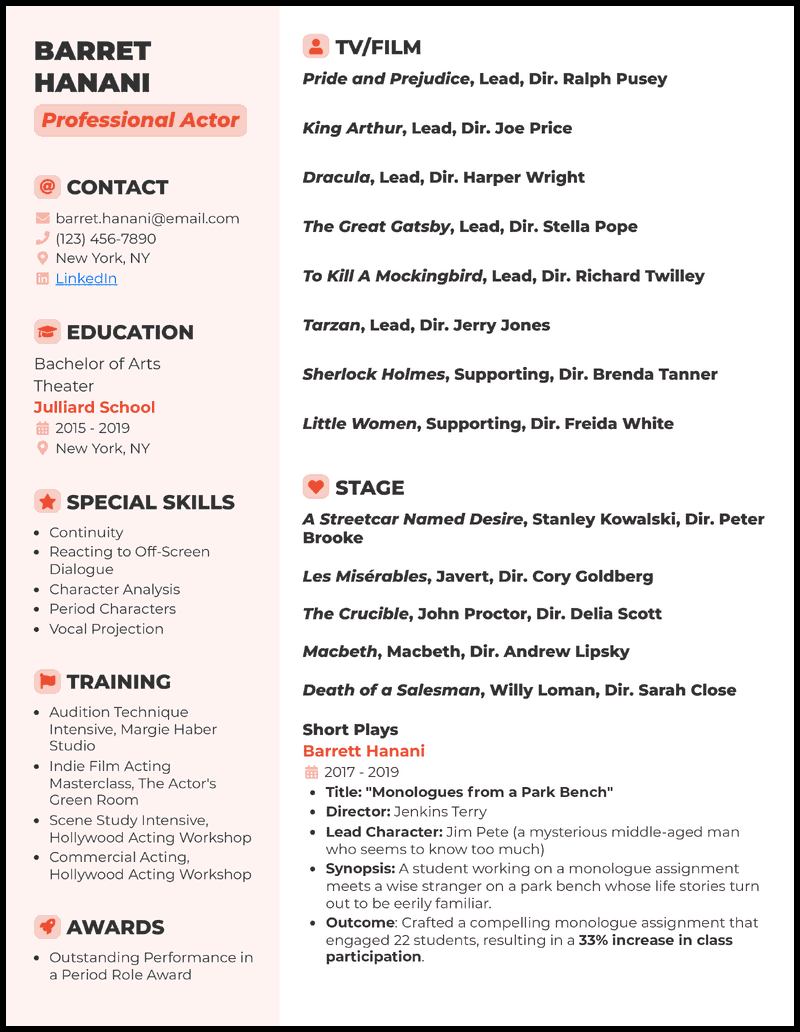As a professional actor, you embody every character and turn the world into your stage. Whether on-screen or on stage, your expressive talent helps you channel your emotions into every character you play, helping bring stories to life and moving audiences.
In an industry where every role is a unique endeavor, it can be hard to describe your special set of skills. However, showcasing your versatility and range as an actor through a well-crafted resume goes hand in hand with selecting the ideal resume template, vital to securing the roles you set your sights on.
That’s where we come in. Our cover letter maker and professional acting resume examples will help you express your value and land the gig of your dreams.
Why this resume works
- Before crafting your professional acting resume, ask yourself: What makes me stand out from the sea of aspiring stars in the industry? (Other than your passion, of course)
- Think about achievements or awards that show you’re not an average actor but a showstopper. Take a cue from Barrett, who nailed it by including awards like Outstanding Performance in a Period Role to show that he’s just the person directors need for historical movies/shows.
Related resume examples
What Matters Most: Your Unique Skills & Acting Experience

At this stage of your acting career, you’ve already found your own unique style and refined it through thousands of hours of practice.
Whether this involves a strong affinity for acquiring accents and emotional expressiveness, or excellent movement and coordination and comedic timing, this section is where you want to emphasize the blend of skills that make up your exceptional abilities.
Try to avoid being vague here and leave out generic soft skills like emotional intelligence and communication. While these are important, it’s best to focus on your acting ability and let your soft skills shine through examples of your work and through the casting process.
9 best professional acting skills
- Script Analysis
- Voice Control
- Improvisation
- Line Memorization
- Cold Reading
- Accent Acquisition
- Vocal Projection
- Period Characters
- Method Acting
Sample professional acting work experience bullet points
You’ve sunk your teeth into a wide range of roles, so by this point, you have a lot to brag about. Use this part of your resume for that exact purpose. Fill it with the titles of productions you’ve appeared in, including the character and the director. For stage plays, include the name of the theater.
Don’t limit yourself to just mentioning your works of the same kind as the production you’re applying to. Instead, talk about the roles you’re most proud of, be they plays, commercials, shows, or movies.
Pick out a good selection of roles that genuinely express your range as an actor, and be ready to discuss what makes them your favorite during the casting process.
Here are a few examples to get you started:
- Tarzan, Lead, Dir. Jerry Jones
- The Great Gatsby, Lead, Dir. Stella Pope
- Les Misérables, Javert, Dir. Cory Goldberg
- A Streetcar Named Desire, Stanley Kowalski, Dir. Peter Brooke
Top 5 Tips for Your Professional Acting Resume
- Fine-tune your resume for each role
- Stand out from other candidates by avoiding sending the same resume to multiple acting gigs. Instead, update your resume for every job, including the roles you’ve played and the skills you possess.
- Include some examples
- While it’s crucial that your resume does a great job of summarizing your value as an actor, it can help to give casting directors a little more to go on. Include a short video or audio with each application to help them get a better sense of who you are. This could be made specifically for this role, or something from one of your past roles.
- Showcase your accolades and industry memberships
- If you’ve won any accolades during your career in acting, or are a member of any professional acting organizations such as the Screen Actors Guild (SAG) or the Actors’ Equity Association, highlight these in your resume. This will help demonstrate your caliber and commitment to your profession.
- Emphasize your range
- Show off your versatility as an actor by mentioning the wide range of acting styles you’re proficient in, such as classical, method, improv, or musical theater. Include examples of roles where you used each style to reaffirm these skills and show your ability across various genres.
- Highlight your flair for languages and accents
- If you’re well-versed in multiple languages or accents, highlight this in your resume. Being fluent in different languages or accents can open up an entirely new set of opportunities that otherwise would have been unavailable to you.
Unless you have more than a decade of acting experience, it’s best to stick with a single-page resume. If fitting all your work experience proves challenging, prioritize including only the most recent and relevant roles.
Absolutely! Unless you’re applying for a voiceover role, it’s essential to include your headshot as well as details of your physical attributes such as your height, weight, eye and hair color, or the length of your hair.
If you have a manager, you definitely should. Your talent manager is how casting directors will get in touch with you, so it’s important that you include their contact details along with your application for each role.








